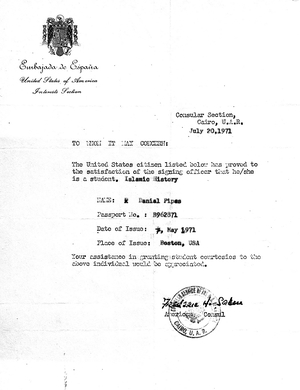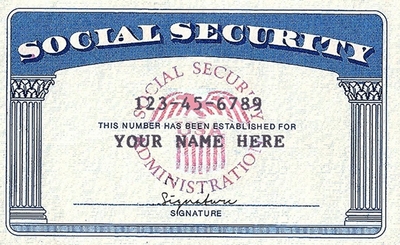I turn 75 years old today and two facts loom. First, the Social Security Administration reports that over 40 percent of my male American peers are already deceased. Second, 75 marks the accepted point when physical and mental abilities begin markedly to decline.
 A July 20, 1971, certificate from the U.S. interests section of the Spanish embassy in Cairo, accrediting me as a student of Islamic history. |
That one began precisely as I turned 20 years old. I announced it to my parents in a September 1969 letter: "My studying this year is ... a complete break with the past. I have gone into the Middle East business with totalness." Indeed, my college classes consisted of Arabic language, medieval Islamic history, Saharan anthropology, and the Arab-Israeli conflict.
Studying the Middle East defined my life for the next 55 years, including an undergraduate degree, three years in Cairo, a Ph.D., teaching at four universities, working at the State and Defense departments, heading one think tank and founding another.
The Middle East remains important to me, but now so does staying healthy. Sustaining the health-span, I realize, has five main components. One of those, the financial, required planning over the decades. The other four – emotional, mental, nervous, physical – require discipline going forward.
Financial: Getting old is expensive; Social Security and private pensions provide the basics but not enough. Therefore, each of us must save for old age. That means an awareness over the decades that what one spends in youth and middle-age will not be available when old. If done right, on reaching 65 or so, finally released from the burden of planning for the future, we have enough to spend more freely.

Emotional: Health requires cultivating friends, giving priority to loved ones, and avoiding loneliness. The latter does special damage; a recent study, "Do We Become More Lonely With Age? A Coordinated Data Analysis of Nine Longitudinal Studies," finds, in a paraphrase, "When loneliness goes unchecked, it can be dangerous to our physical and mental health, and has been linked to problems like heart disease, dementia and suicidal ideation." So, resist crankiness, cherish those in one's life.
Mental: In my old career, I made a living, built a reputation, and gained some influence. As a writer, I was fortunate to have a career both stimulating and not physically strenuous. At 75, the old career becomes a component of health. The priorities of money, career, and impact diminish, those of staying sharp, busy, and useful increase. The work remains the same but its function shifts. For someone with a less sustainable career than writing, turning 75 demands finding something new and useful to do.
Nerves: A low-stress life becomes deeply beneficial at 75, so pace yourself. This means get along, stay calm, avoid disputes, let go of little things, leave enough time, do not attempt too much.
Physical: Staying in shape consumes so much time that, to some extent, it replaces gainful employment. Go to sleep early. Avoid setting an alarm. Dine early. Eat well and not too much: preferably home cooking, hold the sugar. Fast intermittently. Nap often. Exercise. Do physical therapy. Religiously take medications, on time. Floss and brush teeth. Obey doctors and dentists as though drill sergeants. Pay out of pocket for a full-body MRI.
In all, the National Institute on Aging sums up a study of almost 3,000 older adults as showing "that healthy lifestyle factors — physical activity, not smoking, not drinking heavily, following the Mediterranean-style diet, and engaging in mentally stimulating activities — can have important benefits. People who engaged in four or five of these behaviors had a 60 percent lower risk of developing Alzheimer's compared to those who only followed one or none." In short, it all pays off.
 My mother lived to 98 and my father to 94. Perhaps more important, his final article came out when he was 93. By that measure, I have yet eighteen years to go; in the Jewish tradition, eighteen is the auspicious number of chai.
My mother lived to 98 and my father to 94. Perhaps more important, his final article came out when he was 93. By that measure, I have yet eighteen years to go; in the Jewish tradition, eighteen is the auspicious number of chai.
Mr. Pipes (DanielPipes.org, @DanielPipes) is president of the Middle East Forum and author of Israel Victory: How Zionists Win Acceptance and Palestinians Get Liberated (Wicked Son). © 2024 by Daniel Pipes. All rights reserved.
(The Washington Times published this article two days early. My birthday is on September 9.)
 Washington Times illustration by Linas Garsys: Staying healthy and old age. |
Sep. 9, 2024 addenda: (1) Lucy Freeman Sandler, 94, who retired from teaching in 2003 after 39 years as a professor of art history at New York University, had this to say in a recent article titled "Golden Age: Long after retirement, these professors are still publishing. Is scholarship their fountain of youth?":
"Though I'm a 'retired scholar,' I'm not retired from scholarship." ... She believes she is healthy of mind and body at 94 because she has "a calling." She has "always wanted to do research and to write about what I've found," she says. "I still want to do that, and I can." Besides, "nobody asks your age when you want to publish something."
(2) For the opposite point of view, see Ezekiel J. Emanuel, "Why I Hope to Die at 75:
An argument that society and families—and you—will be better off if nature takes its course swiftly and promptly." The author draws several implications from this approach:
- Once I have lived to 75, my approach to my health care will completely change. I won't actively end my life. But I won't try to prolong it, either. ... I will accept only palliative—not curative—treatments if I am suffering pain or other disability.
- Spend more on treating children and less on the aged.
- Spend more on research on Alzheimer's, the growing disabilities of old age, and chronic conditions and less on "prolonging the dying process."